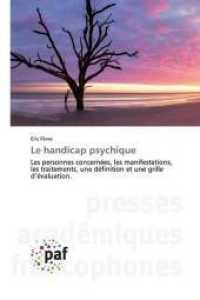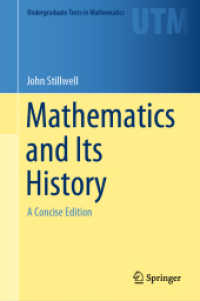Full Description
Originally published in 1992, this book was the first to gather together the view of industrialists, teachers and researchers. It focusses on the skills dimension of arts graduates which carry significant implication for all undergraduate programmes. It examines how the humanities and the world of work interact and how the relationship might be shaped in the future as the United Kingdom moved rapidly to a system of mass higher education. This book will be of use to all those responsible for enabling the new graduate of whatever subject to develop their skills and marketability to the full.
Contents
Introduction Geoffrey Channon Part A: Employers' Requirements and Expectations 1. Prudential Corporation Brian Corby 2. British Rail Colin Wheeler 3. IBM UK Ltd Peter McManus 4. National Westminster Bank plc Kelvin Moore 5. Association of Graduate Recruiters Helen Perkins Part B: The Skills Dimension 6. Classifications and Models of Transferable Skills David Bradshaw 7. Employment, Skills and Career Orientations: English and History Undergraduates Compared with Other Undergraduates Chris J. Boys 8. Humanities Graduates in the Labour Market Eva Stina Lyon Part C: Aspirations and Expectations of Students and Graduates 9. Student Perceptions of their Personal Development Through Higher Education and their Preparedness for Employment Sue Drew and Roger Payne 10. The View of a Recent Graduate Chris Chadwick Part D: Institutional and Curriculum Responses 11. Humanities and Employment: A National Perspective Christopher Ball 12. Humanities and Employment: The Institutional Perspective David Watson 13. Curriculum Development and the Role of the Tutor Kenneth Wilson 14. The Pegasus Initiative: A Case Study in Developing Transferable Skills Peter Findlay 15. Arts Graduates and Employment: A Careers Adviser's Perspective Patricia Pearce Part E: Conclusion 16. Making the Connections: Humanities, Skills, Employment Heather Eggins.








